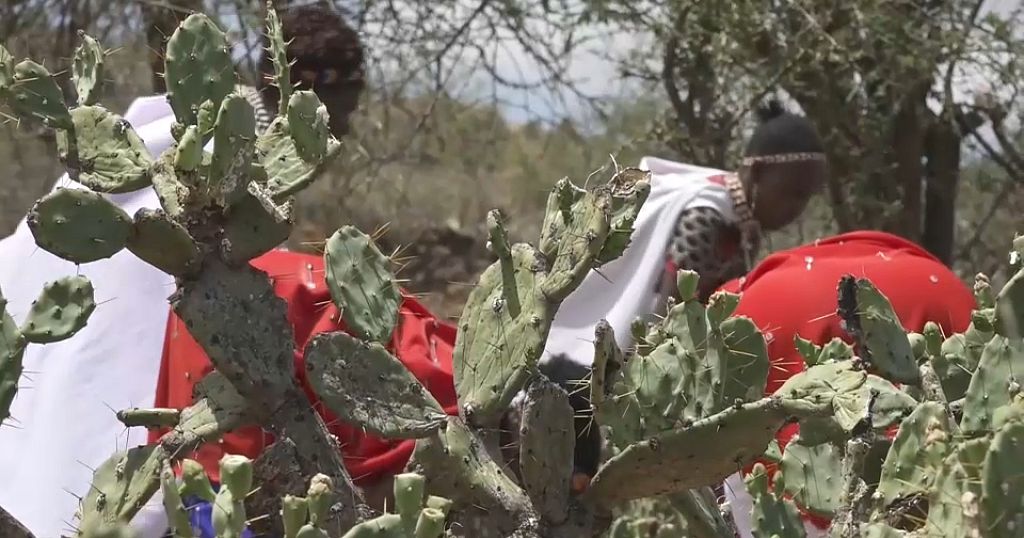
A group of women in central Kenya are on their way to harvest prickly pear that will be turned into biogas.
The cactus is an invasive species which is disturbing the ecosystem.
Its encroachment hinders wildlife navigation as well as reducing grazing areas. Some animals which consume the plant’s fruit can suffer from digestive issues due to its small hairs.
Now a women’s group in Laikipia County has transformed the problem into a new enterprise.
Prickly pear was introduced in Kenya in the early 1900s.
“Historically people say it was brought by the colonial government to fence around the colonial government offices as a flower, but all of a sudden it just spread all over Laikipia North due to the dispersal from different animals like elephants, birds, human beings, livestock like goats and cows,” Rosemary Nenini, a member of Iloplei Twala Cultural Manyatta Women Group says.
The Iloplei Twala Cultural Manyatta Women Group counts 203 members who are now employed in converting the cactus pulp into fuel.
They can also use it in their homes. This approach not only eradicates the cactus but also offers an alternative livelihood source.
“We came together because in Maasai culture, women do all the domestic work and own nothing at home. So we want to empower ourselves and just believe that when you want to empower yourselves, you must come together, lobby for resources as we did as Twala women and now we can manage the 40 acres of land that we get from the Twala community land,” Nenini says.
“We are also able to manage natural resources and that is why we are also coming with an idea of making biogas out of the cactus and also selling fruits and generate income that helps us to educate o-ur children.”
The fruits from the cactus are edible if separated from their sharp spines.
The Twala women at Laikipia Permaculture therefore use all parts of the fruit, creating a range of products including jams that are then sold.
“We get the fruit from the women’s group. We wash them, we grind them to separate the pearl and the seed,” Serah Wangare, a juicer at Laikipia Permaculture explained.
“The seed we put them in the drier which we grind them to get the oil, the oil we give it back to the women’s group which they then use to make cosmetics, the shower gel, the body lotion. And (from) the pearl we make the juice and the jam.”
Protecting biodiversity
According to the UK-based Centre for Agriculture and Bioscience International (CABI), uncontrolled invasive cacti could invade over 70% of natural pasture, significantly impacting rangelands.
The consequences include reduced biodiversity and limited livestock access to pasture.
Loisaba Conservancy, a 58,000-acre wildlife habitat in northern Kenya, home to iconic species such as lions and wild dogs, also grapples with the invasive cactus.
Animals unwittingly facilitate the spread of this invasive plant.
Baboons, elephants, guinea fowl, and tortoises consume the sweet fruit and disperse the seeds.
However, elephants, while skilled at extracting the fruit from spiny thorns, sometimes suffer from digestive issues due to the fruit’s small hairs.
“Elephants are a big challenge that they eat a lot of opuntia […] the hairs of the fruit can irritate the gut lining, create diarrhoea and sometimes even irritation in the gut,” says Tom Silvester, the Conservancy’s Chief Executive.
Combatting this invasive species proves challenging, as it spreads aggressively, even on barren rock.
Traditional removal methods, like manual labour and burning have proved ineffective.
Teams now use heavy machinery to uproot the cactus, transferring it to designated areas and burying it in deep pits to minimize carbon emissions during decomposition.
This strategy results in fertile zones where native plants can regenerate and flourish.
As of June 2023, Loisaba Conservancy successfully cleared 3,100 acres of opuntia, marking a significant step in the fight against this environmental menace.
Research scientist Winnie Nunda from the Centre for Agriculture and Bioscience International says it’s a step towards preserving the country’s biodiversity.
“Our rangelands provide very important growth spaces for these species so ideally in rangelands that have been overgrazed and disturbed by human influences, it tends to grow faster and spread faster than native species, thereby displacing them and having an impact on biodiversity. And for livestock, because it is spreading and not allowing native grasses to grow, so it impedes access to pasture and reduces pasture carrying capacities of these landscapes,” she says.
Read More: World News | Entertainment News | Celeb News
African News









